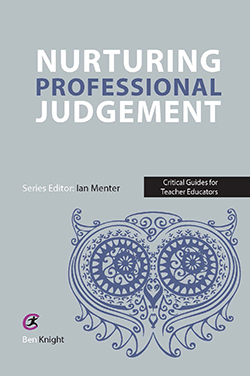This is a review of Nurturing Professional Judgement by Benjamin Knight. Click on the title or the link below for more information.

Nurturing Professional Judgement by Ben Knight is an inspiring, thought-provoking, and useful book. It has been inspiring for me, as it has led me to explore ways of inquring into what underpins my own, and colleagues’ professional judgement. It is thought-provoking, as it poses questions about how teachers make decisions in classrooms and how judgement can be categorised and made explicit. It is useful, as it provides answers to the question, ‘How can we nurture professional judgement in new teachers?’
Professional judgement may not be identified as a specified focus in current teacher education policies in England, but as practitioners we know it lies at the heart of our own work. Ben Knight categories professional judgement into two types: judgement 1, which relates to planning and thinking about what we are going to do in our teaching; and judgement 2, which involves instant decision making in a classroom context. He explores both these forms of judgement and provides case studies and strategies for scaffolding learning about, and reflection on, teaching decisions. Helping new teachers to take appropriate risks, to experiment, to notice decisions and their effects and to learn from these, is a difficult task. This book shows why it is important to do this and gives us approaches to try.
Teacher educators, school-based mentors and staff in universities working with new teaching colleagues, as well as new teachers themselves, will find a wealth of knowledge and ideas in this easy to read, concise and engaging text.
Joy Jarvis (Professor of Educational Practice), University of Hertfordshire

